Description
0.06mm Thin KA1 Electric Wire
The Crazy Wire Company are best known and long established as Europe’s preferred suppliers of top quality KA1 electric wire. We have enormous stock levels at all times as we use this wire to weave our mesh products.
KA1 wire is made of an iron-chromium-aluminium alloy that provides high resistance to heat and oxidation, allowing it to operate at temperatures up to 1400°C (2550°F).
The 0.06mm size refers to the diameter of the wire. This is a very thin wire size, and it is commonly used for precise heating applications that require low power consumption. The thin size also makes it suitable for use in small, compact heating elements.
Overall, KA1 0.06mm electric resistance wire is a reliable and efficient solution for high-temperature heating applications where precision and durability are critical. It is commonly used in a wide range of industries, including automotive, aerospace, medical, and electronics.
Technical Specification:
- Diameter – 0.06mm (60 Micron – 42 AWG)
- Ohms/ft – 496
- Ohms/ft – 4.94
- C = Min – 0% Max – 0.08%
- Si = Min – 0% Max – 0.7%
- Mn = Min – 0% Max – 0.4%
- Cr = Min – 20.5% Max – 23.5%
- Al = Nominal Comp – 5.8% – Min – 0% – Max – 0%
- Fe = Balance
Available KA1 Options:
- 1.15mm (17 AWG) – 1.35 ohms/m
- 1.02mm (18 AWG) – 1.77 ohms/m
- 0.9mm (19 AWG) – 2.15 ohms/m
- 0.8mm (20 AWG) – 2.84 ohms/m
- 0.7mm (21 AWG) – 3.58 ohms/m
- 0.6mm (22 AWG) – 4.94 ohms/m
- 0.65mm (22 AWG) – 4.26 ohms/m
- 0.64mm (22 AWG)
- 0.5mm (24 AWG) – 7.11 ohms/m
- 0.55mm x 0.1mm – 26.05 ohms/m
- 0.55mm (23 AWG) – 5.96 ohms/m
- 0.4mm (26 AWG) – 11.46 ohms/m
- 0.48mm (25 AWG) – 7.79 ohms/m
- 0.45mm (25 AWG) – 8.93 ohms/m
- 0.42mm (26 AWG) – 10.6 ohms/m
- 0.3mm (29 AWG) -19.89 ohms/m
- 0.38mm (27 AWG) – 12.79 ohms/m
- 0.37mm (27 AWG) – 13.26 ohms/m
- 0.35mm (27 AWG) – 14.69 ohms/m
- 0.34mm (28 AWG) -15.15 ohms/m
- 0.32mm (28 AWG) -17.46 ohms/m
- 0.2mm (32 AWG) – 46.11 ohms/m
- 0.28mm (30 AWG) – 22.75 ohms/m
- 0.27mm (30 AWG) – 24.86 ohms/m
- 0.25mm (30 AWG) – 29.29 ohms/m
- 0.23mm (31 AWG) – 34.36 ohms/m
- 0.21mm (32 AWG) – 40.44 ohms/m
- 0.1mm x 0.2mm – 71.83 ohms/m
- 0.1mm (38 AWG)
- 0.18mm (33 AWG) – 56.98 ohms/m
- 0.17mm (34 AWG) – 62.57 ohms/m
- 0.15mm (34 AWG) – 82.52 ohms/m
- 0.13mm (36 AWG) – 107.87 Ohms/m
- 0.12mm (36 AWG)
- 0.09mm (39 AWG) – 228.40 ohms/m
- 0.08mm (40 AWG)
- 0.07mm (41 AWG)
- 0.06mm (42 AWG) – 496 ohms/m
- 0.05mm (44 AWG) – 577 ohms/m
Why Use The Crazy Wire Company
- Quality of products: The Crazy Wire Company always offer high-quality products that meet industry standards and customer expectations.
- Selection: We offer a wide variety of wire products and sizes to meet the diverse needs of our customers. We have more than 600 products available through our site and counting.
- Price: We always offer the best value possible. Our wires are available as part of our major weaving processes, so it is bought at the best possible rate.
- Availability: Our products are kept in house and are ready to ship immediately.
- Customer service: Our experienced staff help our customers feel confident in their purchases and provide assistance when required.
What Else Is Available?
We do not only offer KA1 round wire. We also have a huge range of stainless steel wire and Ni80 round wire in immediate stock too.
Ribbon wire and flat wire are stocked for immediate dispatch too.
FAQs About This Wire
Which Metals Are Used For Making Coil Wires?
Several metals are commonly used for making coil wires, depending on the specific application and performance requirements. Some of the most common metals used for coil wires include:
1. Copper: Copper is a highly conductive metal that is widely used for coil wires due to its low resistance and high thermal conductivity. It is also relatively affordable and easy to work with, making it a popular choice for many types of coils.
2. Aluminium: Aluminium is another popular choice for coil wires due to its high conductivity, low weight, and affordability. However, it is less conductive than copper and has a lower melting point, which can make it less suitable for high-temperature applications.
3. Silver: Silver is one of the most conductive metals, and is often used in applications where high conductivity is essential, such as in high-frequency or high-performance coils. However, it is relatively expensive and can be difficult to work with.
4. Gold: Gold is also highly conductive and is sometimes used for high-performance coils where corrosion resistance and reliability are important. However, it is even more expensive than silver and is not as widely used.
What Is KA1 Wire Made Of?
KA1 wire is a type of high-temperature resistance wire made from iron-chromium-Aluminium (FeCrAl) alloys. The exact composition of the alloy can vary depending on the specific grade and manufacturer, but typically consists of approximately 20-30% chromium, 4-7% Aluminium, and the remainder mostly iron, along with trace amounts of other elements such as silicon and manganese.
The specific composition of KA1 wire is carefully balanced to provide a range of desirable properties for high-temperature heating and electrical applications, including:
- High-temperature capability: KA1 wire is designed to withstand high temperatures without melting or degrading, making it well-suited for use in heating elements, ovens, and other high-temperature applications.
- Corrosion resistance: The addition of Aluminium and other elements provides KA1 wire with a protective oxide layer that helps to prevent corrosion and other forms of degradation at high temperatures.
- High resistance: KA1 wire has a relatively high electrical resistance per unit length, which makes it well-suited for use in heating elements and other applications where resistance is needed to generate heat.
- Durable and long-lasting: KA1 wire is known for its durability and long life, which can make it a cost-effective choice for heating elements that are used frequently or for extended periods of time.
What Is The Coefficient Of Thermal Expansion Of KA1?
The coefficient of thermal expansion (CTE) of KA1, a type of iron-chromium-Aluminium (FeCrAl) alloy, is typically around 10 to 11 μm/m°C. This value can vary slightly depending on the specific composition and manufacturing process of the particular KA1 wire being used.
It’s important to note that the CTE of KA1 can change with temperature and is typically higher at higher temperatures. Additionally, the CTE of KA1 can be affected by other factors such as the direction of the measurement, the state of stress, and the presence of impurities.
Why Does Heat Affect The Resistance Of A Wire?
The resistance of a wire is affected by heat due to the relationship between temperature and the motion of the electrons in the wire. As the temperature of a wire increases, the energy of the electrons also increases, causing them to move more rapidly and collide more frequently with the atoms in the wire.
These collisions increase the resistance of the wire because they make it more difficult for the electrons to flow through the material. This is known as the temperature coefficient of resistance, which is a measure of how the resistance of a material changes with temperature.
In general, the resistance of most metals, including the metals used in electrical wires, increases as the temperature increases. However, the magnitude of this effect can vary significantly between different materials.
In summary, heat affects the resistance of a wire by increasing the energy and motion of the electrons in the wire, leading to increased collisions and higher resistance.
The Crazy Wire Company is a leading UK based supplier of nichrome, FeCrAl, and stainless steel wires. We specialise in rapid delivery to any location around the country. Our factory is located in Warrington, which is the historic home of the UK’s wire industry.
Check out our blog ‘everything that you need to know about wires’ for more information on resistance wire in general. Our goal for our blogs and help guides is to answer as many questions as possible to help to explain the possibilities of mesh to our customers.
We also offer similar products through our highly popular eBay store, check us out there too.
Contact our team today if you have any questions at all. We are always really keen to help in any way that we can.

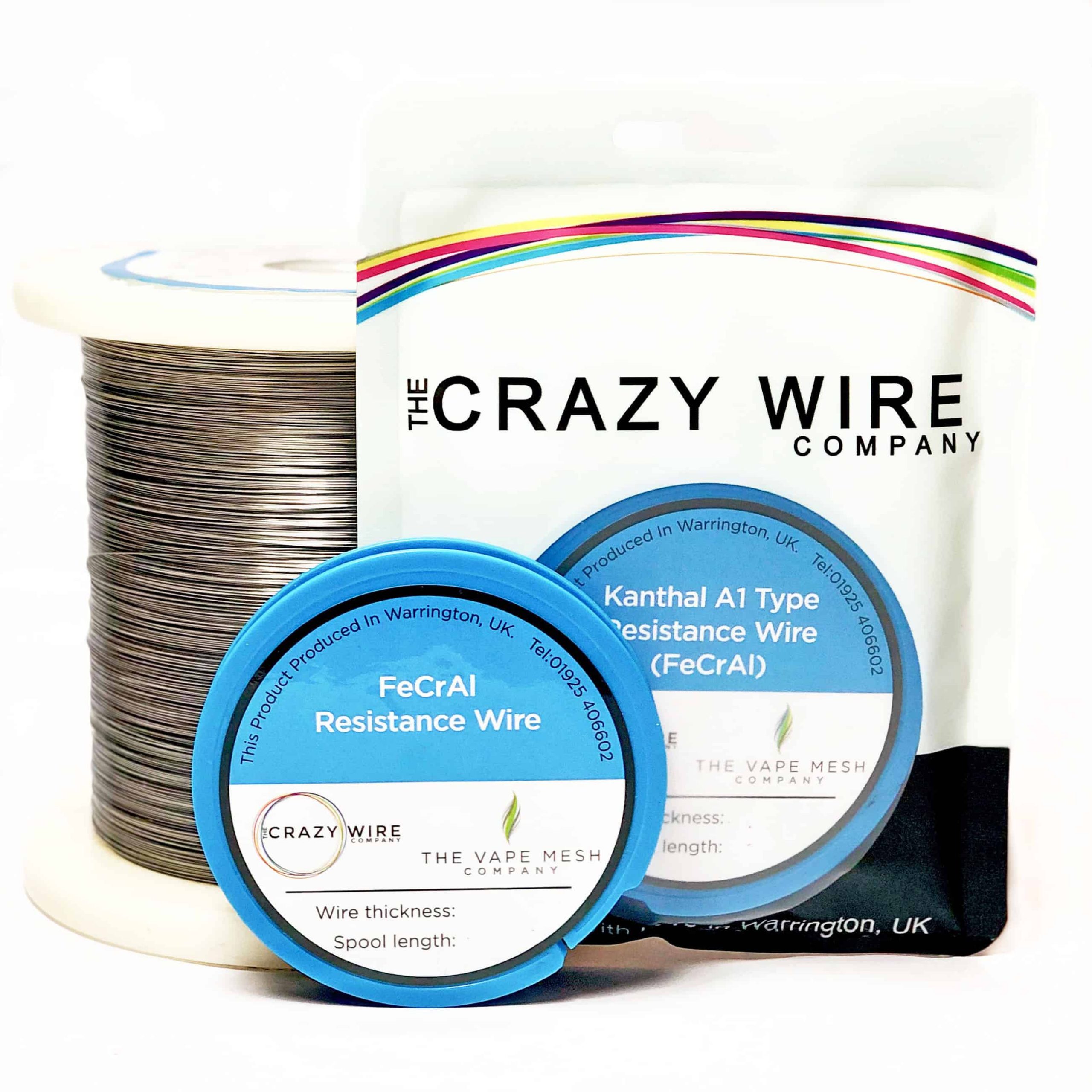


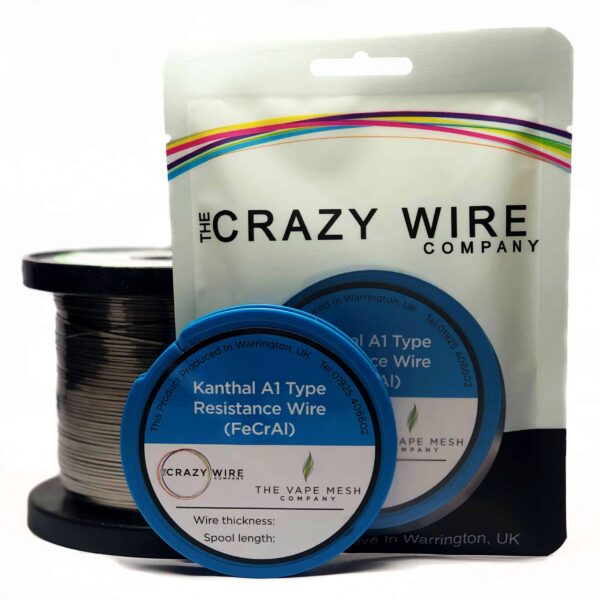
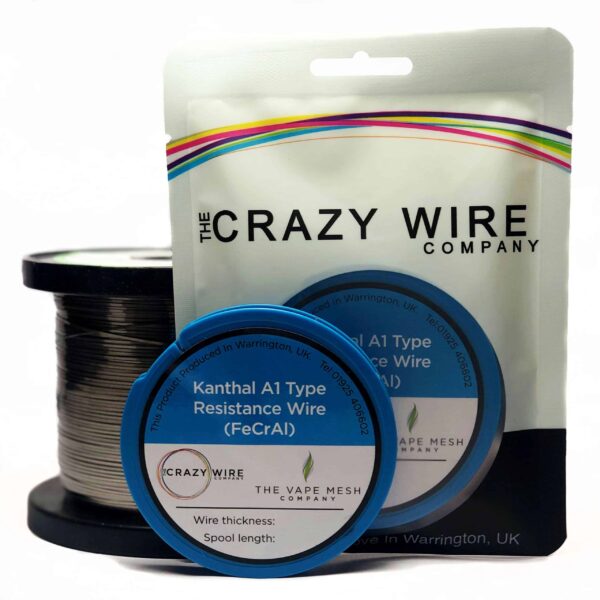
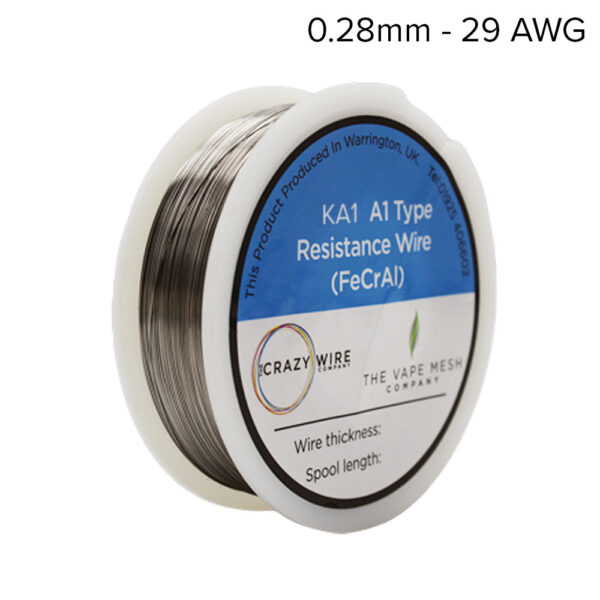
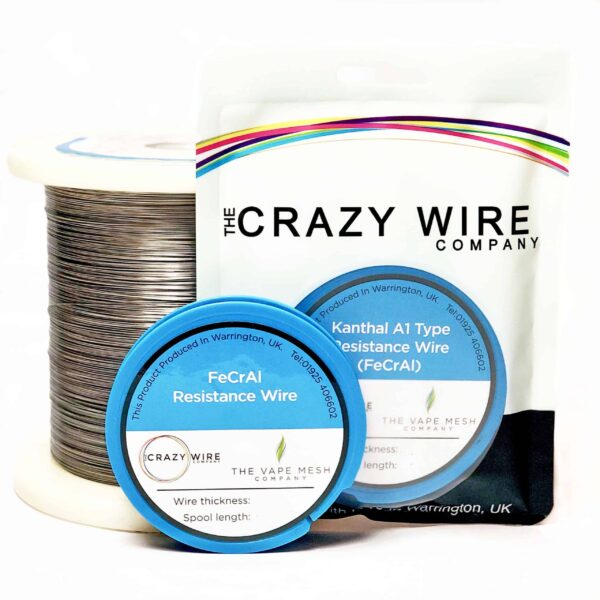
Reviews
There are no reviews yet.